What inspires me: Nature and the ordinary people working to protect it.
My motto: Follow your passion despite your fears and make time to enjoy the moments along the way.
Best advice: The next big idea you have, just start doing it. It’s the small steps that build momentum. Don’t die with a mind full of great ideas, the world will lose out. Give yourself space to just be, immerse yourself in beauty and connect to the world outside of you, clear your mind, listen to your heart and have fun romping around your imagination. Play and give yourself time to think. Hang out with positive people and avoid the negative talk. I remember in my office in Fremantle I had an armchair and my walls were covered in photos of my travels, artists work, poems, Leuning cartoons and anything that was beautiful and inspired me. Every day I’d find time to sit and ponder and then I’d work really hard.
It was after nightfall that an eight-year-old Rebecca Millar followed her guide into the womb of an old-growth forest. Switching off her torch, she waited for her eyes to adjust. And there before her was the land of a fairy-tale. Hundreds of glow worms lit up the mossy forest banks with mystical pinpricks of light. She gasped at their beauty, her face a picture of wonder. The image of this enchanted world stayed with her long after, a memory that so perfectly captured the magic of Mother Nature. So when she later learned that such habitat was to be logged, she was aghast. “I just thought, you can’t destroy a fairy-tale,” she says. “I’d always had this faith in adults but suddenly realised that they could do these terrible things.” And so began the stirrings of a fierce determination to protect what she loved, to consciously live in a way that would nurture our planet.
Fast-forward 34 years and Rebecca is sitting in her spacious Kalbarri home, artwork adorning the walls, book shelves crammed with tomes on environmental protection, history, philosophy and art, and reflects on her eight-year-old self. “I’d always learned that it can take one person to change the course of history – we’d have discussions about Dad’s heroes over dinner – and I just felt I could do something to help,” she says. “I’d fallen in love with the world and wanted to protect it. That’s what I love about young people – they really believe they can make a difference.”
“I’d fallen in love with the world and wanted to protect it. That’s what I love about young people – they really believe they can make a difference.”
A conservationist is born
So it was that a teenage Rebecca became something of an environmental activist. She’d attend anti-clearing protests, hang up anti-whaling or logging posters at school and argue for an antinuclear future. She revegetated Bushy Creek as a volunteer and wandered Melbourne’s remnant bushland with naturalist friends.
Aged 18, Rebecca hitched a ride from her middle class Melbourne home to join a protest against the logging of old-growth forests in East Gippsland. She camped here for two weeks, a sleeping bag thrown on the ground wherever she could find a space between the activists in this makeshift commune. The band of environmental warriors chained themselves to trees and screamed slogans at the would-be loggers. Rebecca watched as a grimy protester declared his angst at the logging. And she watched a well-dressed logging company representative responded calmly, well-spoken and well-balanced in his replies. While she agreed wholeheartedly with the protestor, she suddenly realised the importance of protest backed by rationale. “I realised you need a voice but, to make real change, you have to tackle it in a strategic way, or in a way that provides scientific evidence for your arguments,” she says. And that is what the Environment East Gippsland group went on to do. But not before 129 protestors were arrested.
Back in Melbourne, Rebecca would attend meetings where young people fired by high ideals would debate how to save the world. She was at talks that conceived the idea of Friends of the Earth’s anti-nuclear campaign, she argued the merits of socialism versus democracy. She and her friends crowded tiny inner-city apartments to recite literature and poems and paint wild murals on living room walls. These were highly charged times and Bec was swept up in the feeling of revolution.
These were highly charged times and Bec was swept up in the feeling of revolution.
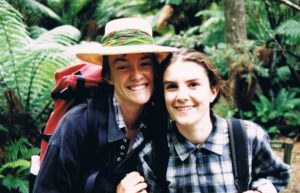
Self-doubt strikes
Around the time Rebecca was protesting, she experienced her first serious case of self-doubt. She’d long dreamed of becoming a sculptor and had invested countless after-school hours developing a portfolio to finally become accepted into the prestigious Victorian College of Arts. Safe in the knowledge she’d been accepted, she hadn’t considered alternate career options – until a careers counsellor said she’d need to put more than one choice on her college application form.
“All of a sudden I realised this was it – this was me creating my future and I had this huge feeling of self-doubt,” she says. “I worried that artists don’t succeed economically, that I was a phony, that I was just pretending I had the skill and ability.”
She turned to a professional sculptor for guidance. He advised that, if she was doubting herself, perhaps the timing wasn’t right. And when he asked for her star-sign she was baffled. What did that have to do with anything? The conversation just added to her doubt. “I remember feeling totally lost, that I’d lost all belief in myself.”
Her parents suggested considering other options. What else was she passionate about? The answer was easy – the environment. And so Bec applied to study environmental horticulture with dreams of restoring landscapes. The artist had turned scientist. But she was soon to discover the transition would be among the hardest of her life.
Study pains
The main problem lay in her previous lack of experience in science. She was going to be an artist, there had been no need to focus on scientific study. To learn, she drew on her childhood experience of overcoming what she believes to have been undiagnosed dyslexia. Overcoming learning difficulties and the feeling of being stupid had taught her to train her brain in a different way. She now counts the way her brain works as a blessing rather than an embarrassment. “It’s such a gift. I think it’s given me the ability to think in pictures, to think big, to think outside the box,” she says. “And by working through it as a kid I realised that, if I worked really hard, believed in myself, tried my hardest and had the stamina, I could do it.”
With the same philosophy in mind she studied hard, damned hard. So at the end of the first year of university she was devastated to learn she’d failed. She wouldn’t be accepted back next year. Her parents blamed her blossoming romance with a young and dashing John Curnow as diverting her attention from her studies. They advised her to consider other career options. But to Bec, it just didn’t make sense. “I just had this feeling that it was wrong,” she says. “I asked if there was anything I could do to get back in but they said we don’t need people of your intellectual ability in the college – basically you’re stupid. This triggered old emotions of feeling stupid as a child. But I didn’t think I’d failed. I finally wrote a letter to the examiner and I found out two weeks before uni was due to start that there had been a ‘computer error’.”
Thanks to a kindly lecturer she discovered the ‘error’ had been submitted by a lecturer who had fought to have her kicked out of the college. To her horror she also discovered 40 per cent of the women had also been told they’d failed. The experience made Bec hell-bent on proving the university wrong. “It just reinforced that belief in myself – that it’s worth fighting for something even when everyone is doubting you,” she says. And prove them wrong she did, graduating another 2.5 years later with a degree in applied science.
“It just reinforced that belief in myself – that it’s worth fighting for something even when everyone is doubting you.”
Stepping up
It was on her first day of her new job teaching unemployed youth about land care that a recently graduated Rebecca found herself amid a band of unemployed teenagers, not much younger than herself. Milling about at a rubbish tip that was to be restored, the scowling youth dragged on cigarettes, scuffed their feet, hands shoved in pockets. Two lit up a smoke in a tunnel they’d dug beneath a towering pile of mulch.
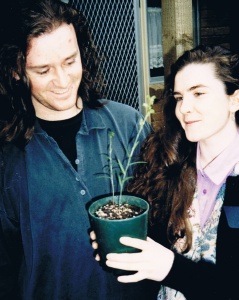
“Please put out those cigarettes. It’s dangerous. That mulch produces methane. The pile could collapse,” Bec ventured. No response. With the realisation she’d need to get tough, she took a deep breath, squared her shoulders, and kicked in their hole with her steel boots. She finally had their attention – and with it launched into a job that fulfilled her dreams of not only restoring degraded landscapes but helped transform disenchanted youths. “It was amazing,” she remembers. “I was outside finally doing what I wanted to do. And we did restore the tip, we did restore habitat, we saw these young people change, gain employment, gain self-esteem.”
Such was the success of the project that Greening Australian head hunted Rebecca as an environmental supervisor where she again worked with unemployed to restore landscapes but on a much bigger scale. She loved the job. And yet, she’d always dreamed of travel, of visiting far flung wildernesses, experiencing cultures foreign to her own. So one day, fearing she was falling into a comfort zone that would be difficult to escape, she simply booked a ticket for a year’s travel throughout Africa and South America. Her family was shocked. John couldn’t understand that she wanted to travel alone. But she was determined. This was something she needed to do for herself.
Adventure beckons
Of course this was no ordinary backpacking holiday. Bec was up for some serious adventure. And among her plans was a solo, three-day wilderness trek . “It was so wild, like I was walking in a nature documentary with birds, flowers, animals – it was awesome,” she says. “But I got to the top of this valley and heard this terrifying sound. My heart was racing and I climbed this tree as a troupe of baboons crowded around the base of the tree thrashing sticks on the ground and baring their teeth. I clung to the tree and thought, great, I’m going to be eaten by baboons.”
“I clung to the tree and thought, great, I’m going to be eaten by baboons.”
She cut the trek short but, as if to prove her sense of adventure was still in check, she quickly accepted a rare invitation to attend a ‘native drumming’. After nightfall, she boarded a canoe and paddled down inky black waters, then walked one and a half hours through scrub and farmland by torchlight. Finally she entered a village, smoke spiralling from fires within huts and hillside trails lit by the lanterns and blazing sticks of dozens of people descending onto the village for the event. Men in red, white and blue tunics began spinning wildly. The sound of drums filled the night. A head priest walked out, touching people who’d collapse convulsing, screaming, like they’d been possessed. Bec, the young white onlooker, was entranced, brimming with a sense of privilege, overjoyed that people were continuing their traditional lives unhindered by the Western world.
As part of her travels, Bec had determined to “also to give back.” So it was that she found herself at a private game reserve Mjingwe Ranch in Zimbabwe where she met an Australian, Natasha Anderson, who was working with the Mwenozi community. Through Natasha’s connections, Rebecca volunteered to provide catchment management advice to help revegetate and protect dwindling water sources in the community. She worked with Natasha to help the local school create a plant nursery with native species that were rich in vitamin C – a move that would help restore the landscape and provide its children with much-needed nutrition. In the process she became captivated by Africa’s people, its immense beauty and, thanks to Natasha, the power for one individual to create change. Natasha still works in Zimbabwe protecting 200 black rhinos from extinction. “It was just unbelievable,” she says. “There was these big wildlife, landscapes, people, humanity, the arts, the sculptures – such beauty in the people and what they did.”
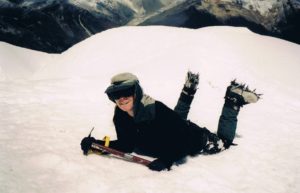
Fired by her African adventures, Bec boarded a plane to South America. Again her parents fretted as she travelled to areas gripped by the Shining Path’s guerrilla war. She ventured to the womb of the Amazon to the Jatun Sacha research station where she did yoga on riverside rocks, brushed tarantulas from her tent, scaled trees with a chainsaw to study the species that inhabited the tree tops, narrowly avoided death by quicksand and travelled atop a train to cross the Ecuador-Peru border with dozens of others who couldn’t fit into the carriages. She climbed her first mountain, leapt across ice crevices with ice picks, completed a 10-day solo trek of the Andes. She felt unstoppable, adventurous, in love with the world. Until she was struck deathly ill alone in a cheap hotel room.
She felt unstoppable, adventurous, in love with the world.
Fight for life
She lay in that room alone for 24 hours, pain knifing through her abdomen, and thought she was going to die. But three American mountaineers discovered her in such a state and dashed her to hospital. When surgeons wanted to operate Bec fought to keep the scalpel at bay. The friends bribed an ambulance driver and ferreted her away to a private hospital as she writhed in pain on the stretcher. They too wanted to operate. But Bec, feeling all spiritual and at one with the universe from her travels, was determined she’d meditate away the agony. Antibiotics and painkillers helped and Bec was able to drag herself aboard a plane back to Australia. It wasn’t until nine months later that she again collapsed in agony and was told she’d be dead in 24 hours if they didn’t operate. Turns out she had a twisted intestine and stomach ulcers. “I just remember thinking I could meditate through it – that I was this awesome hippy, I’d been in the Amazon, I’d visited shamans in Bolivia, I could do this,” she said. “But luckily I finally gave western medicine a chance.”
While the near-death experience knocked her confidence, it taught Bec a bit about herself. She knew she had the strength of mind to keep fear and pain in check. She knew she could be selfish, putting herself at risk and worrying those she loved to achieve what she believed in. And, after a year’s travel, she was more in love with the world than ever. “One of the things that motivated me to travel was the whole concept of ‘who am I?’ that you ask yourself at that age,” Bec says. “Am I result of my friends and family, of society’s expectations? If I’m out of my comfort zone am I still the same person? The response was yes. And I was happy with that.”
Career high
Life back in Melbourne continued in a whirl of work on landscape restoration and leisure time brimming with art galleries, shows, markets, comedy performances, rock climbing, camping and trekking. Rebecca and John hooked up again and, when John accepted a job in Fremantle, Bec was willing to follow him. It wasn’t long before she was working with Greening Australia WA, where she later became state manager. Soon she was travelling to Canberra to lobby politicians – finally protesting in the manner she first envisaged all those years ago among the activists in East Gippsland. This was activism backed by science. And life was great. They’d ride bikes all over Fremantle, grew a native garden and vegie patch, learned to scuba dive, had great friends who’d meet for crazy banquet dinners, where they’d discuss how to make the world a better place.
Around this time Rebecca started to realise the importance of being across all issues facing WA, not just conservation. So she applied and was selected for the inaugural Leadership WA program where she was exposed to the big issues, leaders from all fields and a network of highly motivated professionals from all walks of life . This was the life she’d dreamed of. So, when John suggested they start a family, Bec was terrified of taking the leap. She’d already married and been dragged kicking and screaming into home ownership – fearing a mortgage marked a slippery slope away from the adventurous, conscious living she’d embraced. But kids. This was a terrifying prospect. She felt she was at her prime and wanted to use her new leadership experience as a catalyst for change. However, she finally agreed to at least stop using contraception, and fell pregnant at the first attempt.
Going gets tough – parenthood
Like everything in her life, Bec approached motherhood consciously. She and John discussed the kinds of parents they wanted to be, the kinds of lives they’d lead as a family. To start the plan worked. Until Bec fell pregnant again when her first daughter Hannah was seven months old. She gave birth to their second daughter Evie, and returned to work, tackling high level volunteer and board roles on top of her challenging job and raising two children. It was a juggling act and the balls were beginning to drop. “We had this whole ideal about how it was going to be but it was just so hard,” she says. “We had these little treasures that we just adored and you’d just be split between responsibilities. It was like bipolar. I just had this feeling I wasn’t good enough – at work, at parenthood, at my volunteer roles. I was just exhausted and I got really sick again. I just woke up one day and thought I can’t do it all and I resigned. I think I suffered depression after that – I grieved for the person I was, for the aspirations I had. You’re always told you can have it all and all of a sudden I felt that I couldn’t. And I was angry – I remember being angry at John whose career was thriving and he was travelling to Turkey, Greece, Spain, France. But I didn’t want someone else to bring up my kids.”
Country life
A few years later, sitting atop a giant boulder overlooking the emerald seas of Greens Pool near Denmark, Bec and John decided they wanted to eventually move to the country. Within three months John had been offered a job working on the beta-carotene project at Port Gregory’s Pink Lake – and the chance to study a PHD for the WA Department of Fisheries, in Spain. Bec was all for Spain, but John knew he didn’t want to stay in government. So came the decision to take the job at Port Gregory and move to Kalbarri. Bec’s friends advised her against it. You’ll hate it, they said. What will you do for work? How will you fit in – an activist amid beach-going mums?
But Bec was unperturbed. She approached the move as though she were indeed living in another country. She studied Kalbarri’s history, she immersed herself in its stunning surrounds. She joined the social enterprise group, Pollinators, in Geraldton. She asked the Nanda Aboriginal people to welcome her to country. And in this way, she learnt the remarkable tale of the Zuytdorp – the Dutch East India Company merchant ship which had sunk on the cliffs north of Kalbarri 300 years ago.
Quickly, a number of seemingly disparate events fell into place and Bec found herself proposing a high-calibre five-year festival to commemorate the Zuytdorp’s sinking. It wasn’t long before she was swept up in the whirlwind of talks, meetings with the Dutch Ambassador, travelling to Amsterdam, Budapest and Taiwan to share the Zuytdorp story and hosting the most sophisticated cultural offering Kalbarri had ever seen. These seemingly improbable experiences for a mother of two in Kalbarri seem to have landed in Rebecca’s lap. Even Bec herself was surprised by what came her way, and sometimes wondered how she’d got in such a position. “I think it’s just that I’m open to these kinds of things happening,” Bec says. “I don’t want to sound too hippy but I do believe that there’s something about positivity and authenticity and inspiration that generate momentum. I’ve always had this deep idea that change can happen. I really believe in that.”
“I … do believe that there’s something about positivity and authenticity and inspiration that generate momentum. I’ve always had this deep idea that change can happen. I really believe in that.”
Now sitting in her Kalbarri home, three successful Zest Festival celebrations behind her, Bec thinks back to herself as a youth with big dreams of becoming an artist. She certainly doesn’t regret her move into science. But she finds it amazing that she’s now working with the arts. “I feel like I’ve come full circle,” she says. “And that’s beautiful.”
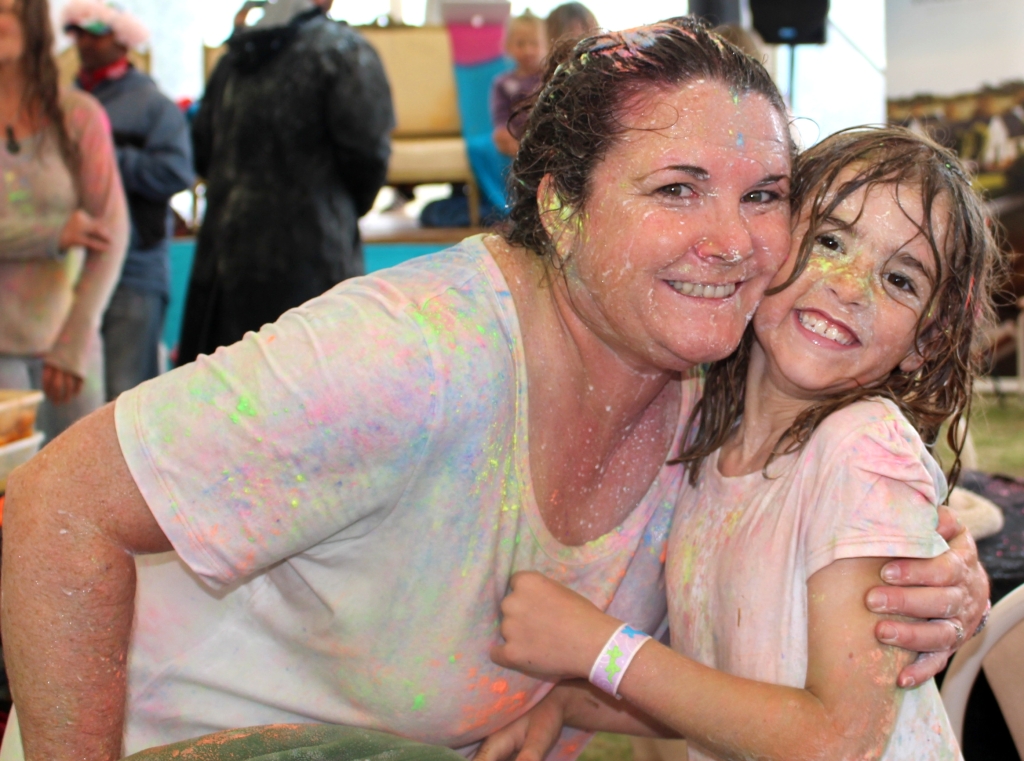
Get involved
Links to information about some of the causes with which Rebecca has been involved:
- Friends of the Earth (www.foe.org.au)
- Greening Australia (www.greeningaustralia.org.au)
- Natasha Anderson (www.lowveldrhinotrust.org/#/staff/4550059887)
- Leadership WA (www.leadershipwa.org.au)
- Pollinators (www.pollinators.org.au)

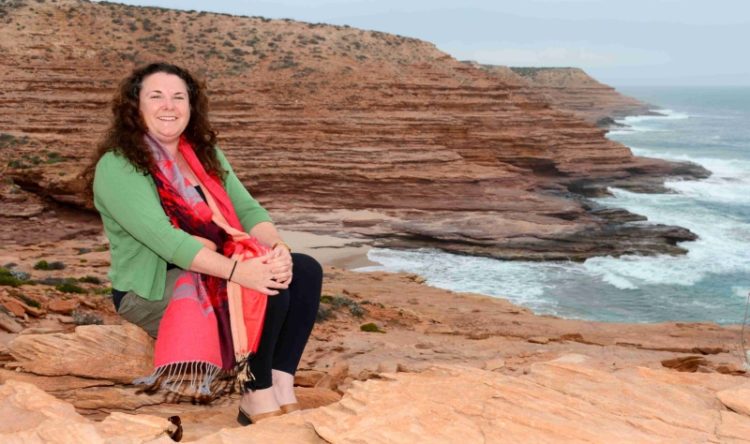
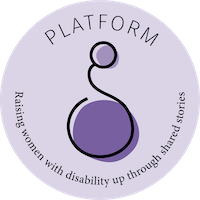

Thankyou for providing such an inspiring story to help me get to know Rebecca better.